Semrush Review & Tutorial: How To Build a Successful Content Strategy

When you buy something through one of the links on our site, we may earn an affiliate commission.
When it comes to keyword research and SEO, there are tons of tools (both free and paid) that you can use. And in this Semrush review, we'll highlight our favorite aspects of one of the most robust options around, and show you what the SEO tool can do for you.
We've had great success building niche sites with the data and monitoring tools of Semrush. So, we'll take you through some examples to show you exactly how we use this tool to perform SEO audits, discover low-competition keywords for our niche websites, and other ways you can ensure to get a great return on your investment!
Get a 14 day trial of SEMrush here
SEMRush Review $99.95/mth
Name: SEMrush
-
Ease of Use - 90
-
Stability - 100
-
Customer Service - 90
-
Price - 70
Summary
SEMRush is an excellent competitor and keyword research tool for both organic search and paid advertising. Highly recommend for competitor keyword research, keyword rankings, and backlink analysis.
Pros
- Great way to find keywords new keyword opportunities.
- “Steal” keywords that your competitors are organically ranking for.
- Discover new competitors and perform gap analysis.
- Broad functions: backlink analysis, historical trends, keyword difficulty scores, PPC advertising research, and more.
- Free option available for limited use.
Cons
- Backlink analysis is a good basic feature, but more advanced tools are better.
- Potentially a high monthly cost for individuals.
- Traffic numbers are not a direct correlation to actual traffic numbers. But trends and comparison of those numbers are very valuable.
Contents
Semrush Review: Overview
Let's start right here with a quick overview of what SEMRush actually is.
If you've been doing SEO and keyword research for a while, you've no doubt heard of the Semrush keyword research tool and maybe even tried it at some point. And special shoutout to the Semrush Keyword Magic Tool, which we have a full guide to here!
If you're just learning SEO, then SEMRush is best described as an all-in-one SEO tool that helps you analyze metrics like keyword rankings, backlinks, competing websites, gaps in your content, and so much more to help with your SEO strategy.
The best part is, you can run this kind of analysis on your own website as well as your competitors – which is where the SEO tool really shines.
Imagine being able to see exactly what's bringing your competition the most organic traffic and then building out content to compete with them.
That's what SEMRush does best, so let's take a look at exactly how we use it to increase traffic to our websites.
Choosing A Niche
If you're still at square one, trying to figure out what you're website is going to be about – SEMRush can help you figure it out.
While picking a niche to enter is a multi-faceted decision, one of the biggest factors to consider is the current competitive landscape.
Are there dozens of entrenched authority websites I'd have to compete against?
If so, what can I offer that will help me stand out from the crowd and carve out an audience for myself?
Another important factor is whether your niche/topic of choice actually has enough interest to make it worth your time. There are quite a few things you can look at to determine potential market size, but when you're creating a niche website, one of the considerations should certainly be how often people search keywords about this topic in Google.
For example, let's say you're bound and determined to create a website to help left-handed violinists but some of the most general search terms like “left-handed violin” get searched only 1,600 times per month:

That should give you pause to consider questions like:
Are left-handed violinists really a big enough audience to build an entire website for?
Would I be better off creating a website for all violinists and including a section for left-handed players? (Hint: yes)
How SEMRush Helps Choose A Niche
Of all of the different factors that go into choosing a niche, my favorite thing to look for is not-so-great website that's doing really well in terms of traffic from organic search results.
My thought is, if a low authority, average quality site can do well in this niche, I can too.
SEMRush makes finding these kinds of sites very simple.
I usually start by searching some product-related keywords where niche/affiliate sites are often found. In this case, I wanted to explore a niche site about owning and caring for a pet fish.
So I searched for “best aquarium filter” in the keyword analytics section of SEMRush.
After scrolling down a bit, I see these are the current top 10 results in Google:

Mentally, I cross out the e-commerce sites and sites with name recognition, like Amazon and YouTube, in these results.
I usually start by clicking on the domain that sounds most like a niche site to me.
For instance, if there were a result here that looked like “best-fish-filter-hq.com” – that would be my first stop!
In this case, I'm pretty sure most of the top 5 are affiliate websites – which is a great sign!
If I'm planning to create an affiliate website, I want to see that Google is ok with ranking other affiliate websites for the keywords I'll eventually target.
I start by clicking on the second result, tropicalfishcareguides.com, and see this overview:
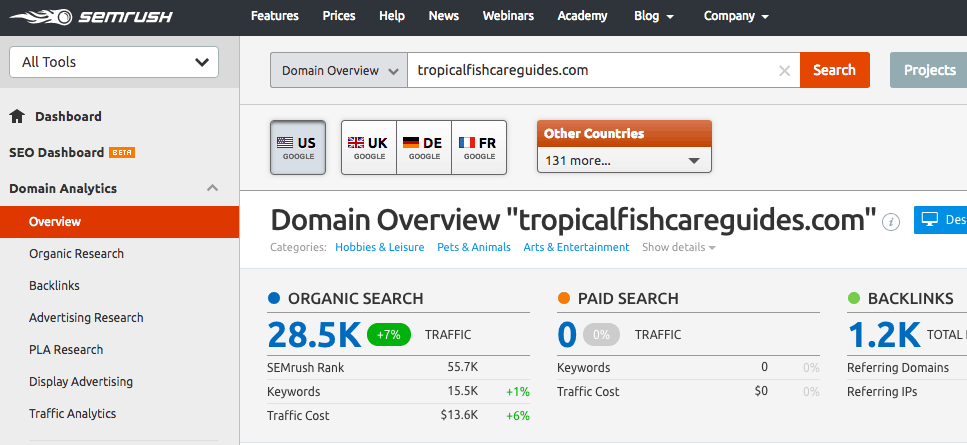
It looks like my first swing could be a home run!
SEMRush shows that this site gets an average of 28,500 visitors from Google each month.
This number is only an estimate, and what I've found through tests by Screaming Frog and personal experience, this number is usually lower than the actual traffic.
So that 28.5K is probably more like 40K or so.
How Much Can You Make From 40,000 Visits?
Let me sidetrack for just a moment and give you an understanding of what you might make if your website was able to get 40,000 visitors per month.
As Spencer blogged about recently, we switched one of our blogs over to MediaVine and have been making about $18 per 1,000 sessions.
So assuming your site was only using MediaVine to make money, that would be around $720 per month ($18 x 40). For many affiliate sites like this one, you'll also be making money as an Amazon affiliate – which is a little harder to estimate a consistent monthly number.
However, a site like this should be making $1,000 per month easily, and perhaps several thousand per month if it's ranking well for a lot of product-focused, “buyer” keywords.
Let's Continue Evaluating The Pet Fish Niche…
The next step is to scroll down and view the full organic keyword report to see everything they are ranking for to get all of this traffic:
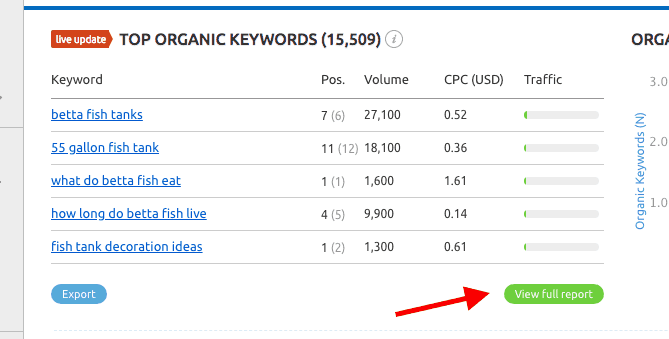
Now I can see all 15,000+ keywords, which are sorted by the (estimated) amount of traffic they bring to the site:
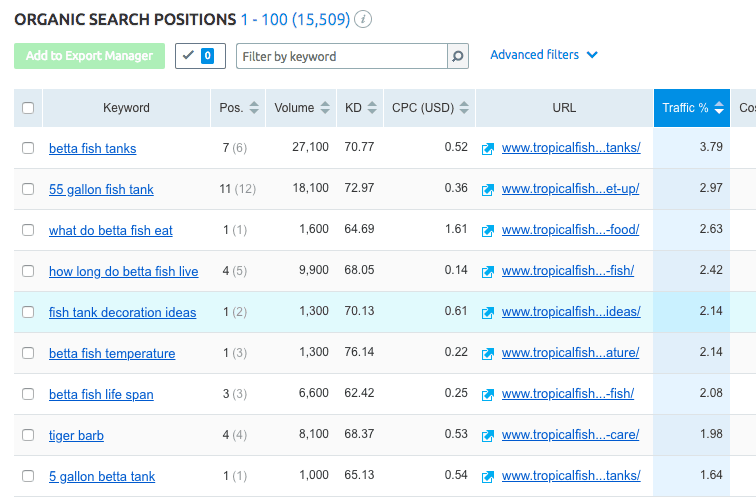
You can really go down the rabbit hole with the keyword research tool at this point by slicing and dicing this data to find all kinds of potential target keywords, but we'll get into that a bit later.
For now, my next question is how authoritative is this website?
My favorite way to get a quick number on this is to jump over to Moz's Open Site Explorer and check the domain authority. (Moz is a paid SEO tool as well, but they give you a few free searches per day).
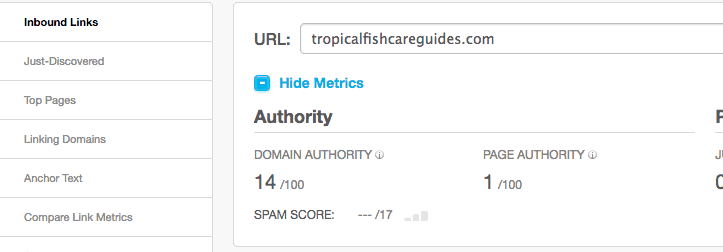
It shows a domain authority of 14, which by any standard is a low authority website. Once a site reaches a DA of 30+ that's considered at least decent authority – so I really try to focus on sites in the low to mid 20's.
Finding something in the teens that's getting a bunch of organic traffic is like hitting the jackpot.
All of this talk about authority simply means that as a newer site, I should be able to compete for many of the target keywords they rank for without having to build tons of high-authority backlinks.
Ideally, from here, I'd repeat this same process and find at least one more site (the more, the better) with similar numbers.
This would give me confidence that I could start a new site to compete with them and expect to see traffic in a reasonable amount of time.
Stealing Keywords
Of all the features that SEMRush SEO tool brings to the table, the one I've found most valuable is how easy it is to “steal” keywords from competing sites.
What does this mean exactly?
As I showed earlier, you can pull up any site, and SEMRush will show you all the keywords in their database the site ranks in the top 100 for.
Best of all, you can filter and sort to your heart's content – so you can really find some gold nuggets of keyword suggestions using this tool.
Let's continue with our pet fish example.
Mastering Keyword Theft
Of course, when we talk about “theft” and “stealing” we aren't really talking about something illegal or unethical. This information is readily available, but the best SEO tools like SEMRush and Ahrefs just make it much easier to find.
You're really just seeing what's working for your competitor, then trying to make it work for you, hence competitive research.
In the fast food world, that's like Subway doing the $5 Footlong promotion, and then when it's a hit, every other fast food restaurant starts offering some special meal for the $5 price point (so you may want an SEO strategy for your restaurant).
So you shouldn't feel like you're playing dirty by doing the things I'm about to show you.
Find The Buyer Keywords
We often refer to obvious affiliate keywords as “buyer keywords” because they are things people search for when they are about to buy something.
For example:
- Best Kitchen Scissors
- Yeti Cooler Alternative
- Top Kids Goggles 2018
- Samsung Microwave Reviews
If you can get organic search traffic for buyer keywords like this, you then have an opportunity to compare and review products the searcher might be interested in and then send them to Amazon, Walmart.com, etc., to buy it and then you, being an affiliate, make a commission on the sale.
Buyer keywords are usually some of the most profitable keywords on your site.
In SEMRush, you can start by going back to the “Organic Research” page for TropicalFishCareGuides.com and using the search box near the top of the list to type in the word “Best”.
Here's what happens:
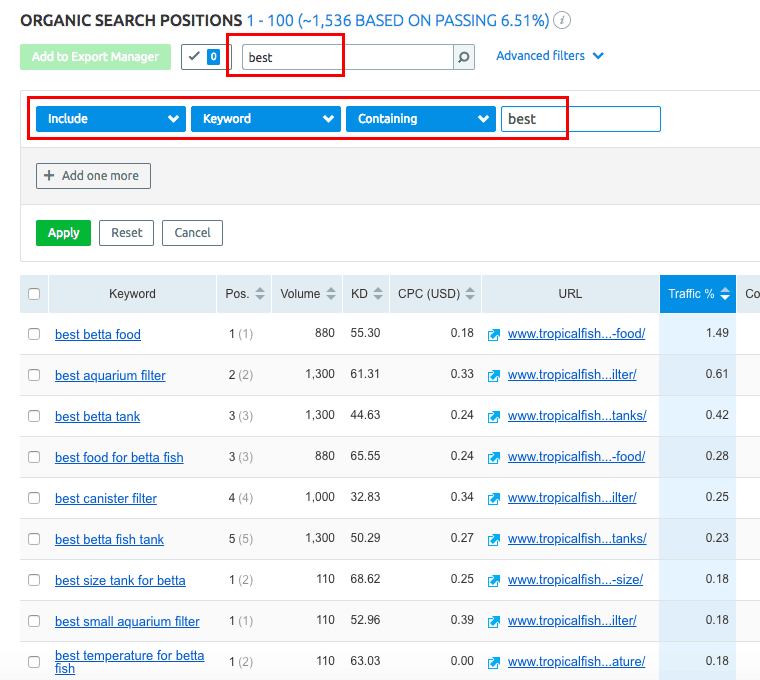
Notice the list is filtered, and now it only shows you the keywords that contain the word “best.”
With a low authority site like this, I don't go much further in my competitive analysis. I work from the assumption that if they can rank page 1 on search engines for a keyword, so can I.
So I'd open up a Google Spreadsheet and start copy/pasting in keyword ideas that seem like a good fit – excluding closely related terms to the target keyword.
For example, if I saw “best betta fish tank” and then “best tank for betta fish” that's really the same thing – so I'd only put one of these relevant keywords in my spreadsheet.
You'd likely have dozens of keyword ideas just from this first search, so now it's time to try some other common buyer keyword modifiers.
Here's what happens when I change my filter from “best” to “review:”
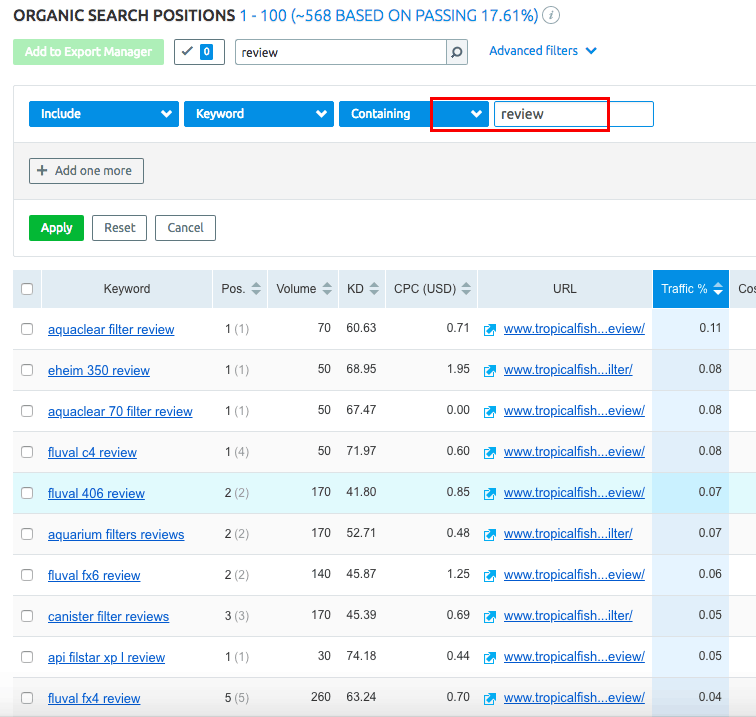
Now if I want to get into reviewing specific aquarium filters and other accessories, I've got a bunch of SEO ideas for related keywords that I should be able to get page one Google rankings for.
You can repeat this process with as many words as you'd like on as many sites as you'd like.
Imagine how many keywords you could come up with in an hour just by using this one technique.
Filters Gone Wild
Filtering my list of keywords to just show those that contain “best” is a very simple application of the filtering concept.
However, you can filter on a ton of useful data points in SEMRush to find more keyword ideas.
When you click the “add one more” button, you can build out a more specific filter:
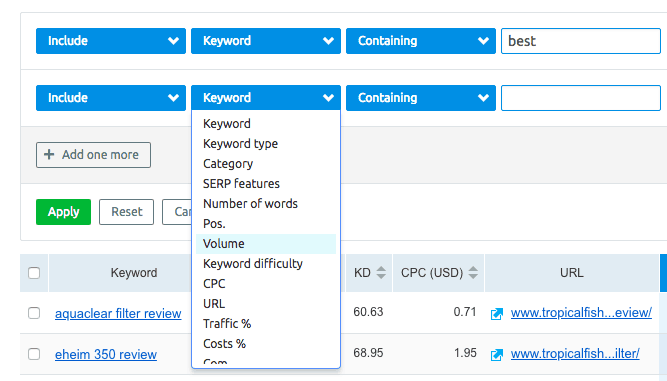
Here's some other simple but powerful filters I use to find excellent keywords with SEMRush:
Find The Best of The Best
One filter I like to run is to take my buyer keyword modifiers like “best” and combine them with their search position. By doing this, I can say only show me the organic keywords where they rank in the top 5 of Google.
Here's what that looks like:
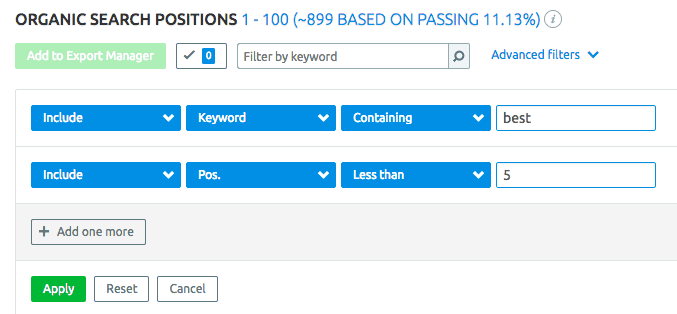
If I'm looking for easy wins, I know if a DA 14 site is in the top 5 of Google, then the keyword difficulty isn't too bad.
Find High Volume Winners
I've stated many times that I'm a fan of going after low-search volume terms. Even if something gets searched 10 times per month, I'll still target that keyword if it seems like a good fit for my site.
However, we all know that ranking for the higher search volume keywords that get searched thousands of times per month is important – as you can be rewarded with a greater amount of traffic.
Here's a filter that shows me every keyword that gets searched at least 1,000 times per month, and our tropical fish site still ranks on page 1 of Google: (Notice only 50 of the 16,000 keywords they rank for meet this criteria)
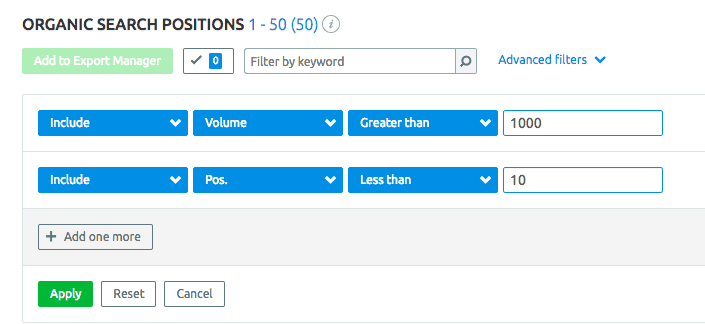
Semrush Review: Find Long Tail Gems
We love long tail keywords for many reasons!
One of those reasons is because they are usually easier to rank for when you build content that addresses that specific question.
Here's a filter that will show me all the keywords they rank for with search volume over 1,000 and the keyword has more than 5 words in it:
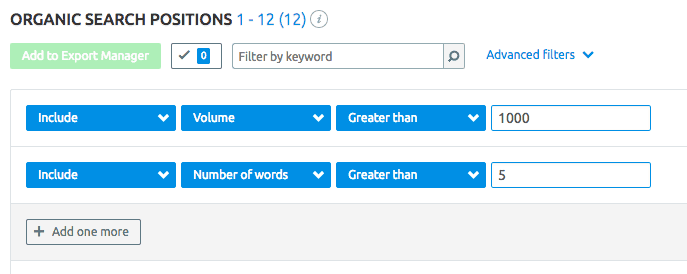
Only 12 of the 16,000 keywords meet this criteria, but these would be some excellent keywords to build informational content around:
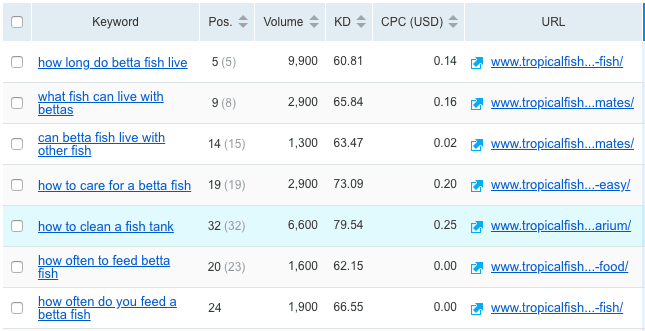
Of course, 1,000 searches per month is an arbitrary number. If I really want to get more ideas for informational content, I could change that 1,000 to 100 and get many more results:
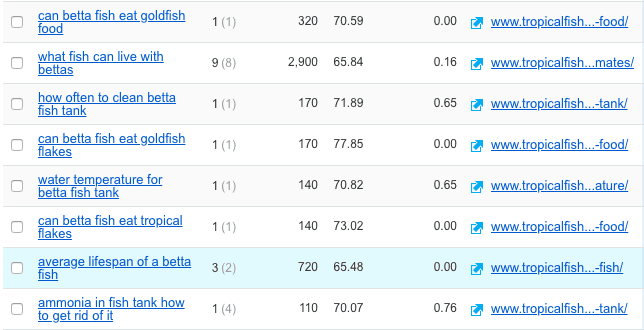
Discover New Competitors
You know that your site has competitors – but do you know who those competitors are?
My guess is that you probably know a few sites you compete with, but there are probably many more out there that you've never heard of.
What if you could find those competitors and do some of the same reverse keyword search (AKA keyword stealing) we just talked about?
Finding previously unknown competitors is another place where SEMRush really shines.
Once I was done picking through the tropical fish site we've been using as an example, I can click on “competitors” to see a list of sites very similar to it:
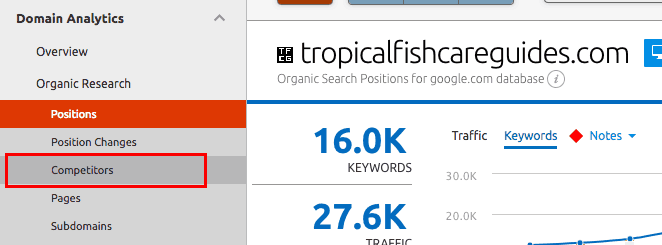
SEMRush sorts the competitive analysis in a very helpful way by default, which is the competition level. In other words, they find the sites that have the most keywords in common and put them at the top.
So you'll usually find some really closely related sites right away and can click on them to do the analysis and keyword theft we demonstrated.
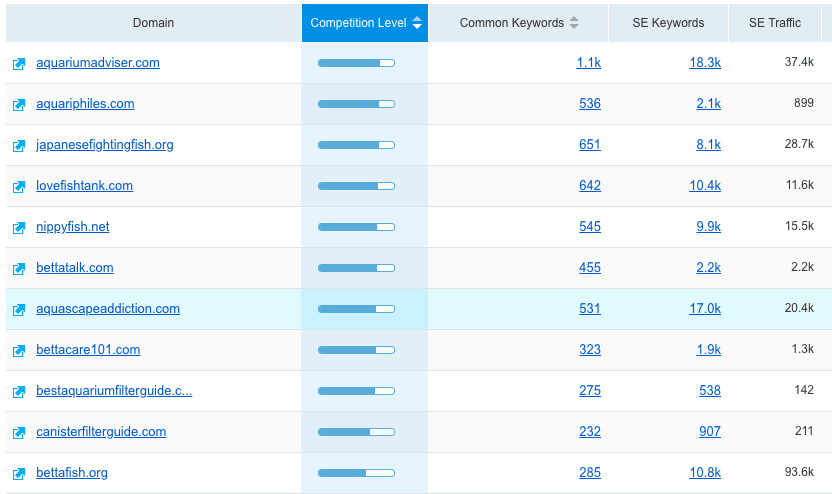
Create A Competitor List
The next thing you want to do is start copying the relevant competitor domains into a separate page of your spreadsheet.
This will work as a helpful competitor domain overview tool so that you don't forget or lose any of them, and if you get distracted, you can come back at a later date and mine their site for more keyword ideas.
You're going to get the most ideas from sites that rank for a lot of keywords – like the first one in the list – Aquarium Adviser. They rank for 18,300 keywords, and based on the name, I'm willing to bet that many of them are buyer-focused keywords about different types of aquariums.
I'll avoid adding e-commerce sites like Amazon to my list because I'm not really an e-commerce store. The same goes for sites like Wikipedia or non-profits – they aren't really competitors in my mind, so I try to only focus on other niche/affiliate sites.
The reason for this is because it's important to know that Google is willing to rank a niche site for a given keyword. If the top 10 results of a keyword are all e-commerce sites that sell a product, I'll usually stay away from that keyword because I know that Google is looking for e-commerce results only.
By only evaluating other niche/affiliate sites, I can still work from my rule of thumb which is: if they can rank for it, so can I.
The next step to build out a more complete competitor list is to click on one of the competing sites, then repeat the process.
So I'd start by clicking on acquariumadviser.com and checking their competitor list:
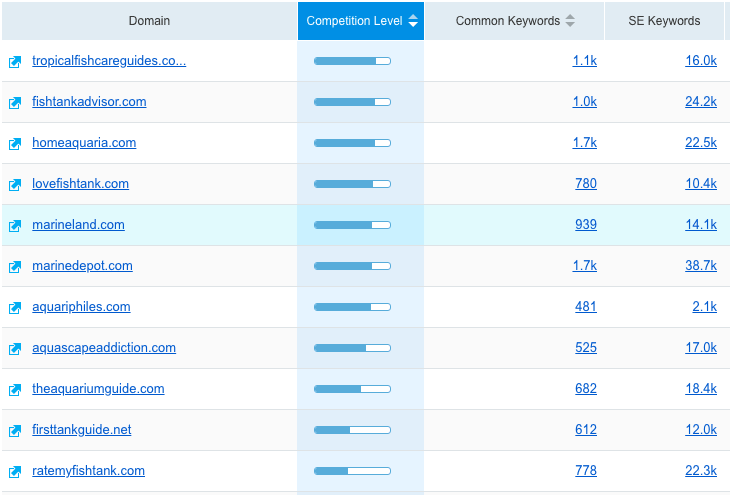
Notice our friends over at TropicalFishCareGuides are on top of the list, but then it gets really interesting.
Sites like FishTankAdvisor.com that ranks for over 24,000 keywords, is next on the list, but it was nowhere near the top of my competitor list of TropicalFishCareGuides.
In fact, there are several sites in this list that I might have missed if I would have only evaluated the competitors of the first site.
You can repeat this process as many times as you need to until you have a solid list of dozens of competing sites to pull keyword ideas from.
Timeout
I'm calling a timeout right here to address the oft cited 80/20 rule. That 20% of what you do produces 80% of the results.
That's where you're at right now with SEMRush.
I'm going to go into a few other useful features, but the combination of finding all the weak competitors in a niche and filtering to “steal” their best keywords is the process I use over and over again to create a content plan for my websites.
If I was building out a pet fish site, I'm confident I could have a list of 100+ REALLY good keyword ideas by spending a few hours doing the process I just outlined.
If you're serious about building a successful niche site, the things we just covered make SEMRush worth buying.
So if you're ready to get started and want to avoid information overload, click the button below and try it for a month:
Try SEMRush NowTime In: Gap Analysis
Zach Morris has ended the timeout session, and we're back to live action.
The next aspect of market research and competitor research with SEMRush is more helpful once you've got an established website.
So for this example, let's assume that I am the owner of tropicalfishcareguides.com and I want to quickly find topics and keywords that my close competitors rank for, and I do not.
I could click on the Gap Analysis, Keyword Gap and then enter a competing domain, followed by my domain, and then a second competitor after that:

The keyword gap tool lets me click on the intersecting circles between each domain and make sure the first one is set to “unique to the first domain's keywords:”

Between the second and third domain, you select “common keywords” and then click “go” to search:

Then, you'll get a list of keywords that both of those sites rank in the top 100 for, but you're nowhere to be found. The goal here is to find more keyword ideas, of course, but also looking for higher-level categories that you may be missing.
Looking at the keyword data results below, maybe I should be doing some content about aquarium gravel, protein skimmers, and CO2 regulators:
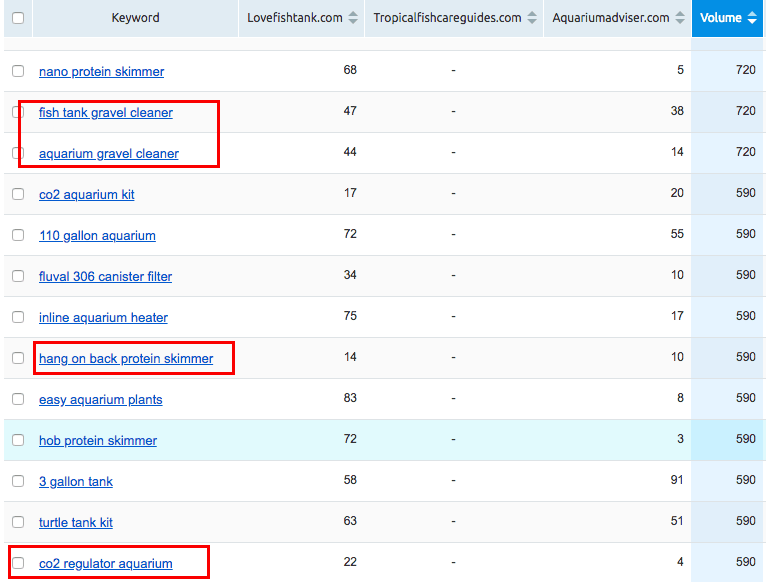
Like everything else in SEMRush, I can add advanced filters to this list and run more gap analysis reports using other competitors I've listed in my spreadsheet.
Another great way to use gap analysis for an established blog is finding out when your competitors are on page 1 of Google and you're on page 2+.
This could be an opportunity for you to improve your SEO or do a content refresh and improve some old blog posts to boost them in the search engines.
The SEMRush blog has a fantastic write-up on how to do this.
Zero In On Top Pages
The final slice of the competitor analysis pie I'd like to share with you is taking a long look at which pages on your competitor's websites get the most traffic and rank for the most keywords.
When you're looking at an organic keyword report, many of the keywords you see are coming from a single page on the site.
For example, there might be hundreds of keyword variations about betta fish food that my competitor ranks for, but all those rankings are for a single page of aquariumadviser.com/betta-food.
So from an SEO perspective, does it make more sense to have one all-encompassing post about betta fish food that targets dozens of keywords?
Or is it better to have dozens of posts about betta food, each one targeted towards a different keyword?
The answer is that “it depends”, but usually going with a longer post that goes deep on a topic is more beneficial in terms of SEO.
The best way to see how your competitor handles this question is by looking at the pages report in SEMRush:
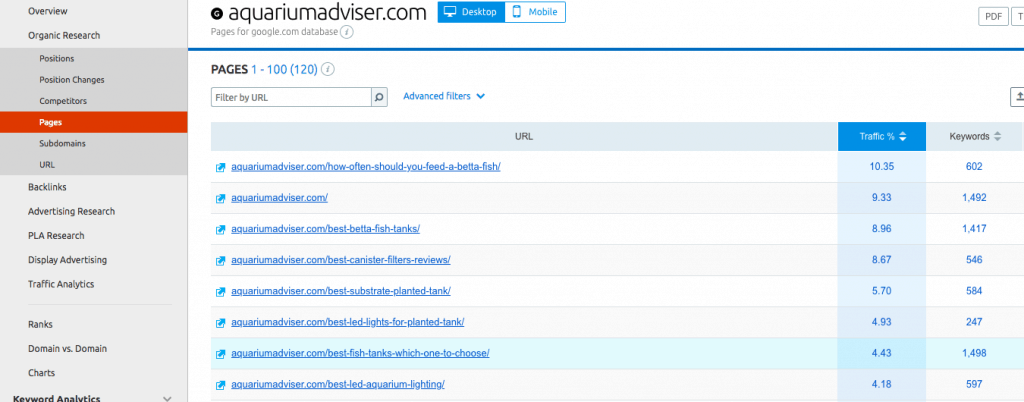
This report estimates that the page getting the most organic traffic is the post about feeding a betta fish. I can see that it ranks for just over 600 different keywords:
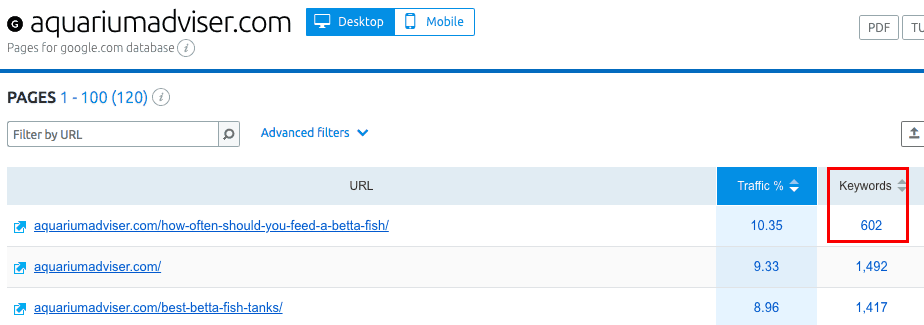
If I click on that number, I can take a look at all 602 keywords this page is ranking for. By default, that list will be sorted by the terms that bring in the most traffic:
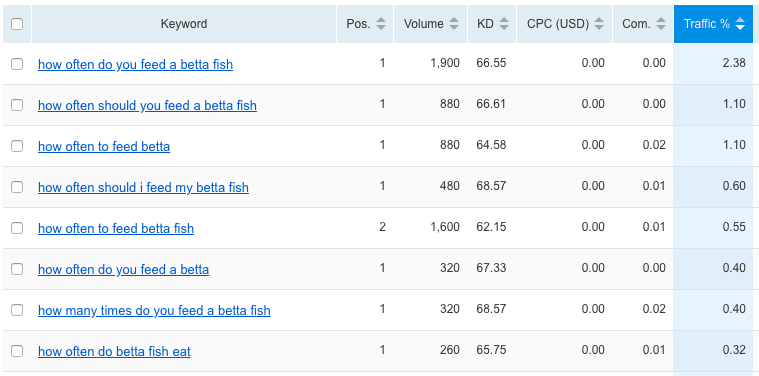
As you can see, we can identify keywords that are mostly variations of the same thing:
- How often to feed betta
- How often do you feed a betta
- How often do betta fish eat
Etc.
That's really not very helpful for our purposes.
The way I like to use this report is to sort by keyword volume and find out what competitor websites are ranking for that gets searched most often:
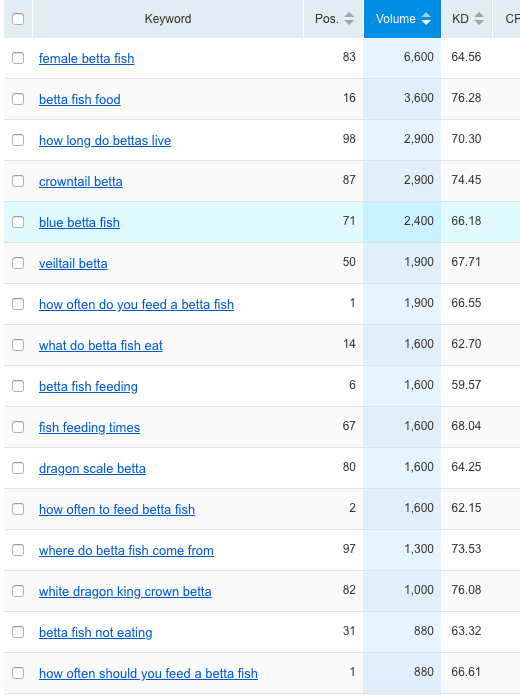
Notice that the page isn't ranked on page 1 for many of these keywords, but that's ok.
What you're looking for here are interesting keywords that they likely could be ranking well for with this post, had they optimized for it.
As I scan this list, I can already see my outline coming together for my big post about betta fish food:
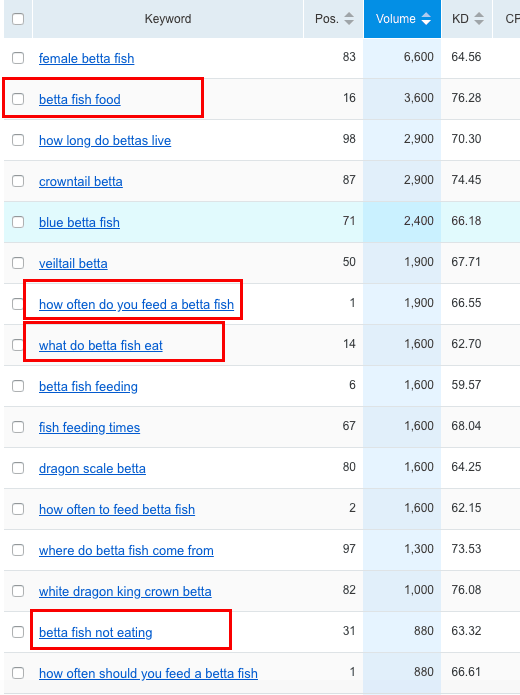
Betta Fish Food would be my primary keyword, then I'd have subsections on topics like:
– What do betta fish eat?
– How often do you feed betta fish?
– What do I do if my betta fish won't eat?
And probably a number of other related topics and questions that fit with my primary keyword.
Traffic Analytics
One of my favorite features of SEMRush is a tool called Traffic Analytics.
No one offers anything like this right now, not even the mighty Ahrefs (or alternatives to Ahrefs).
Traffic Analytics works by giving you an almost Google-Analytics-level sneak peek into your competitors' websites. You can get to Traffic Analytics by going from the Semrush dashboard to Competitive Research –> Traffic Analytics
You type in a website's URL, and you're off to the races.
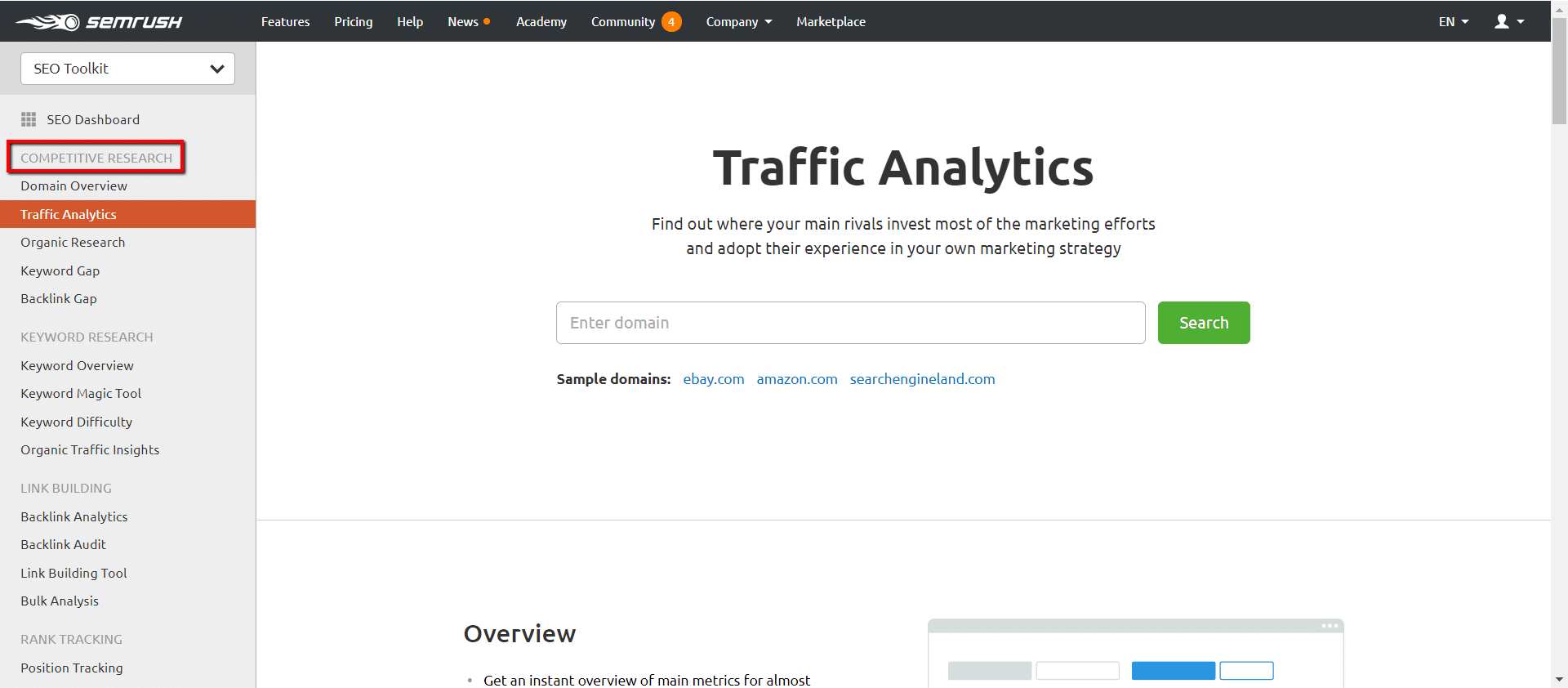
To test accuracy, I'm going to put in NichePursuits.com.
And I've gotta say: I'm pretty surprised at how accurate this tool is.
I'm looking at their data for NichePursuits.com during the month of July 2019. Let's take a peek; then I'll show you some Google Analytics.
Here's what Traffic Analytics shows me:
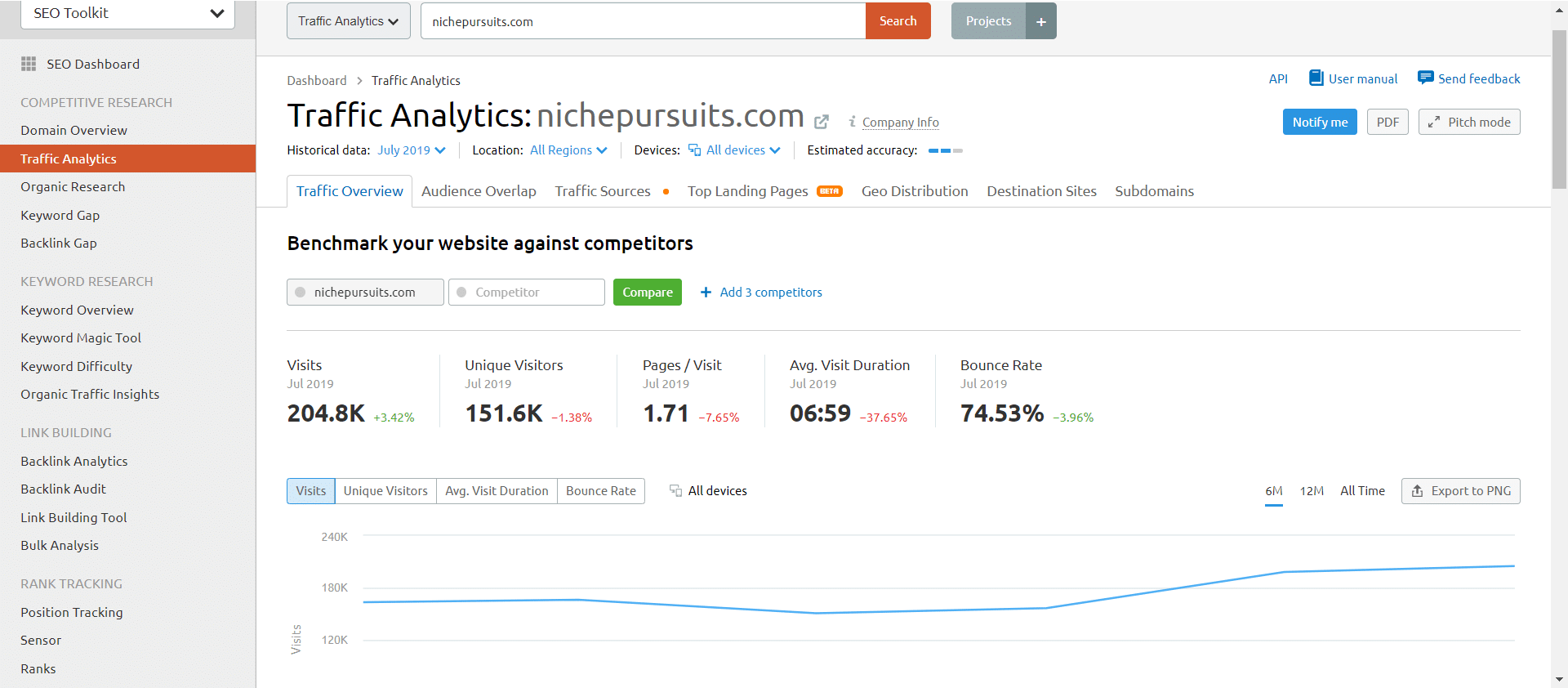
Alright, now let's take a look at Google Analytics and see how the numbers stack up:
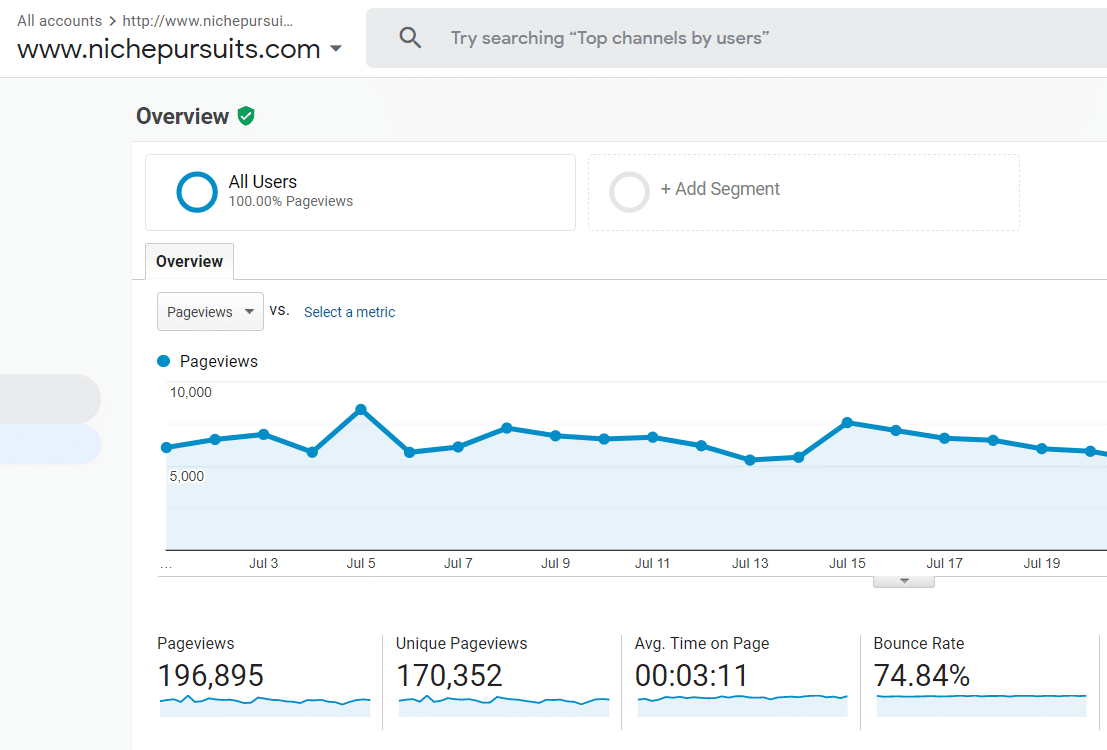
Those numbers aren't too far off. SEMRush has the unique pageviews a little bit low and the regular pageviews a little bit high, but it's not far off. The bounce rate is almost exact, which is super cool.
The time on page in SEMRush is about 2x reality, but I'm not too upset about it. I think they'll get that number closer to reality in the coming months.
I like how I can compare my traffic with my competitor's traffic. You can do this in the regular traffic overview to see who's getting more pageviews, a better bounce rate, etc.
I think this tool is helpful for allowing you to figure out what page designs are working/not working. You can see the bounce rate for various websites:
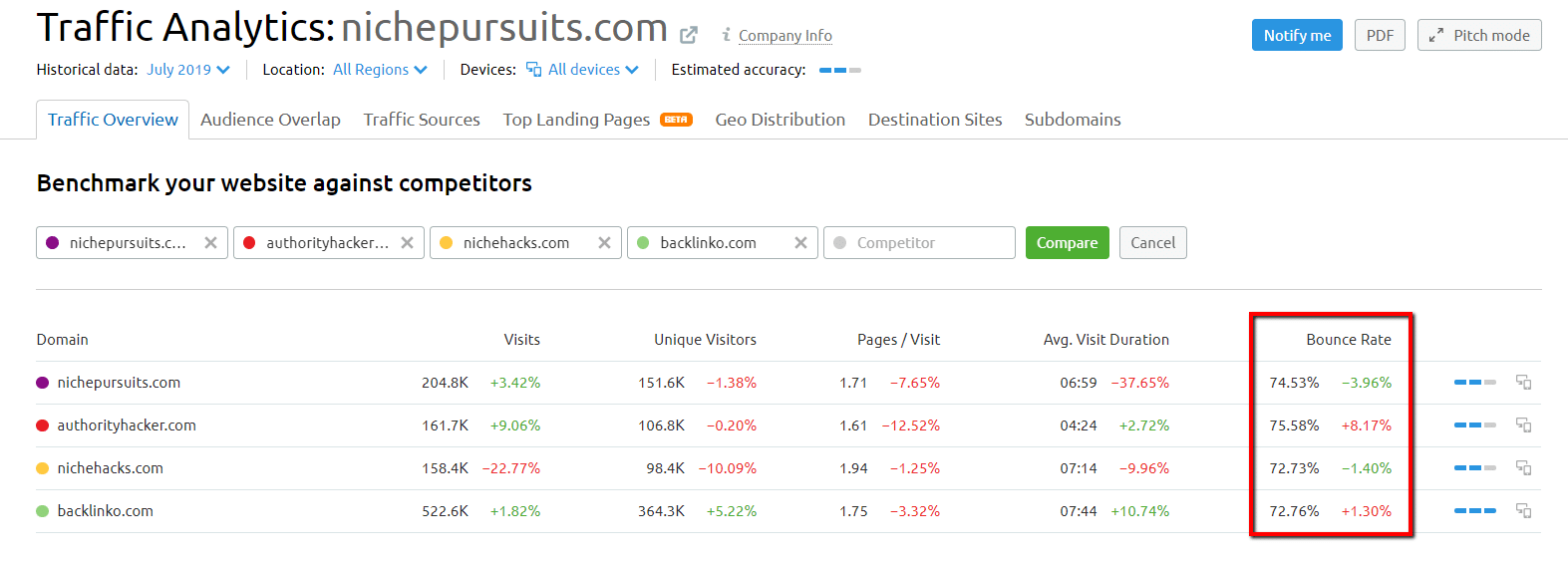
And looking at my Google Analytics, this number is pretty much exact.
You can see that Niche Hacks and Backlinko have the lowest bounce rates among the 4 sites listed. You could use this tool to figure out what website designs are keeping users engaged and active.
SEMRush also includes a section where you can analyze your audience overlap for your competitive research.
And this is awesome.
You can go to the section titled Audience Overlap. Once you're there, put in a few competitors' URLs. You end up with something like this:
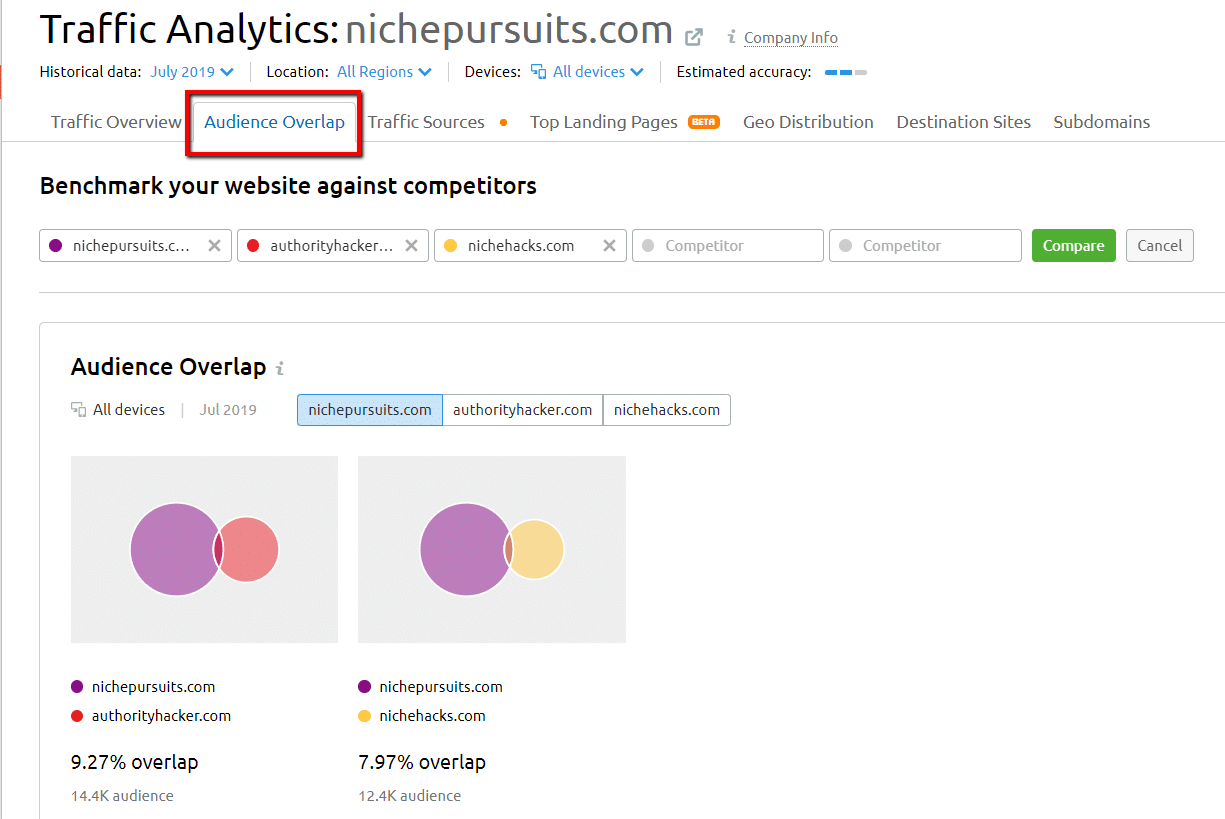
You can see that we share about 9% of our audience with Authority Hacker and about 8% with Niche Hacks.
You know what that tells me?
I need to do some more keyword stealing.
Since there is some overlap, I know that we're ranking for some of the same keywords. Since there's not a lot of overlap, I know that there are some “low hanging fruit” that I might could chase after. Since my competition is ranking for articles that I don't have published, I'm confident that we could publish similar articles and rank at Niche Pursuits.
Traffic Analytics makes for an incredible way to do some competitor analysis. It makes the already-hefty suite of tools even bigger and is something that no one else is offering right now.
Niche Pursuits readers get a special offer. You can click here to try SEMRush free for 14 days with access to Traffic Analytics.
Rank better and beat the competition with SEMRushSemrush Review: What Else Can It Do?
SEMRush is just about the total package and perhaps the best SEO tool in terms of everything it gives you. So while I've gone in-depth on how we use it to spy on our competitors and build out a keyword and content plan – there are plenty of other features that I've not talked about. After all, it's one of the most advanced SEO and content marketing tools around.
I'd like to at least highlight the notable ones for you briefly:
Backlink Analytics
While Ahrefs (read our Ahrefs review here) is considered by many to be the gold standard in backlink analysis, SEMRush has a helpful backlink analytics module to check both your and your competitors backlinks:
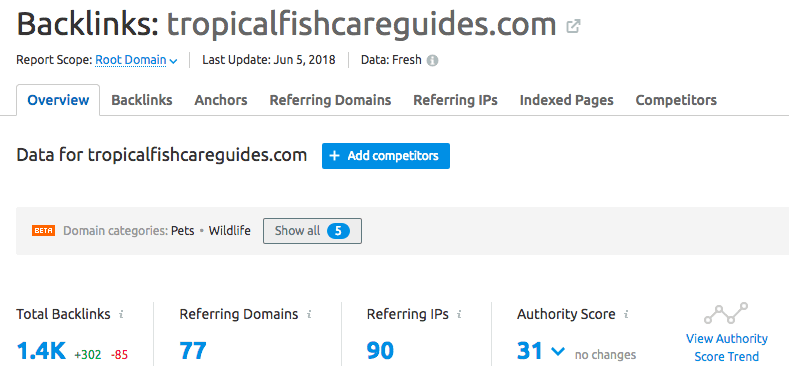
We all know that backlinks matter for SEO, so using SEMRush to see where you competitors best backlinks are coming from may give you some places you can reach out to and get a link from the same page.
Here's a look at a few top links for our example site. Notice that we can filter to only show “follow” links if we'd like, meaning those that pass that tasty SEO juice. You can also see the anchor text being used to link to your site:
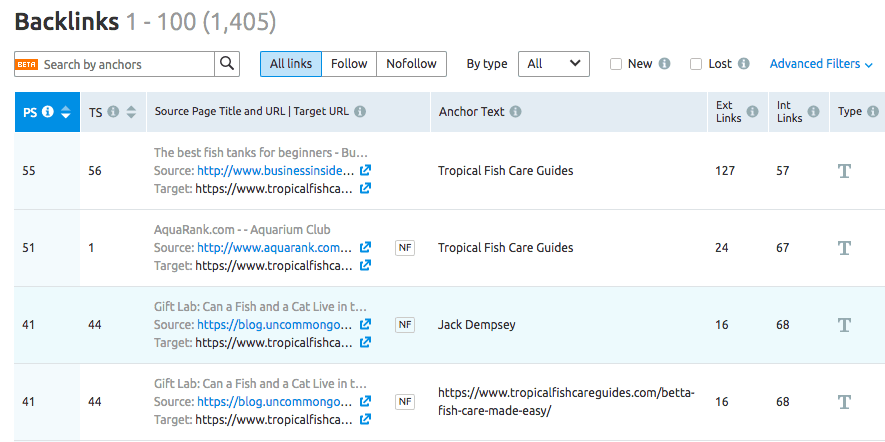
Historical Ranking Trends
This is found on the same organic research page we used earlier for finding our competitor's top keywords. It's a helpful graph that shows how your rankings and organic traffic have fluctuated over time:
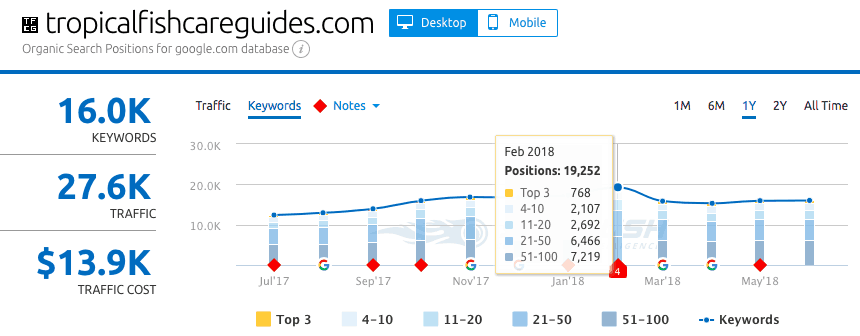
Ideally, a healthy site will show a steady growth over a period of years. If you're evaluating a site to purchase, look here for some drastic dips in traffic or rankings as a potential red flag of a Google penalty, Semrush is after all one of the best Google penalty checker tools available.
Keyword Difficulty Score
I am partial to the KC score in Long Tail Pro when it comes to getting a reliable number to know just how tough it's going to be to rank for a keyword.
SEMRush does have a built in keyword difficulty score that you can see on any organic keyword report. The idea is the same, the higher the number, the harder it is to rank for.
With the way I use tool, I start by finding domains that lack authority and checking out their best keywords. So for my purposes, I don't even check the SEMRush keyword tool difficulty score.
As stated earlier, if I'm looking at a low authority site – I work from the assumption that if they rank for a keyword, I can rank for it too.
PPC Advertising Research Tool
Admittedly this isn't a module I make use of, as I don't run any paid search ads for my sites. However, if you do – SEMRush has a boatload of helpful information in the paid Advertising Research module.
For example, I can click on “Ad Copies” and see what an e-commerce player like Petco is running ads for:
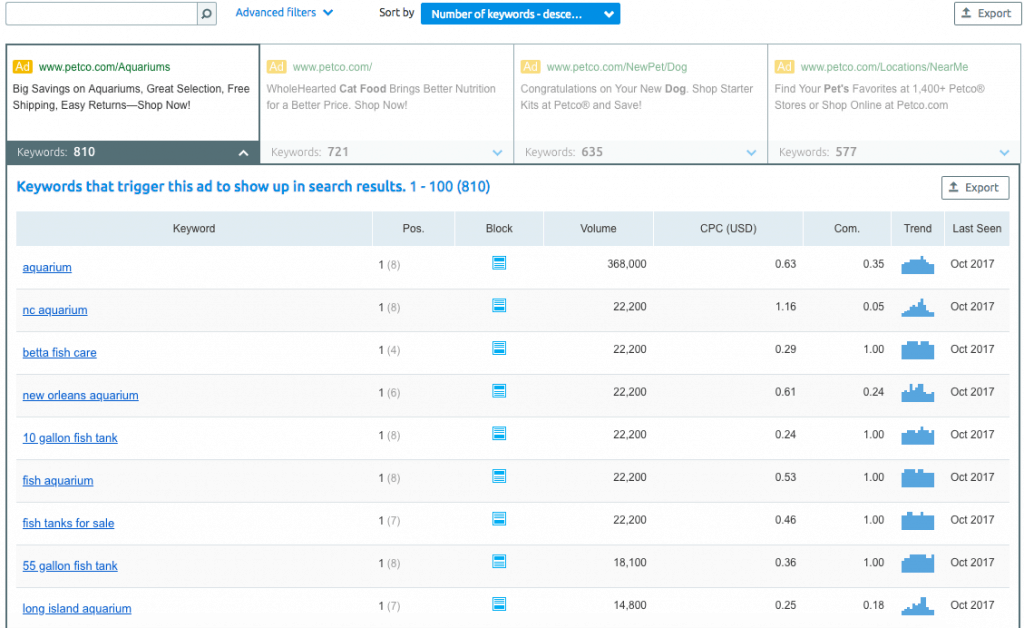
It just so happens that “aquariums” happened to be one of their top campaigns based on the number of keywords they run ads for.
In the screenshot above I've clicked on the 810 keywords and now I can see an expanded list of exactly what they are.
My guess is that Petco probably has some good data on what people are searching for when they are about to buy an aquarium…
Semrush Review: Some Additional Tools Available To You
You can setup a variety of different reports, alerts, and functions inside of a “project” on SEMRush.
This truly can become a one stop shop for the health of your site. Here are some things you can setup in a project:
Social Media Monitoring & Scheduling
Yes, SEMRush offers an entire social media toolkit as well. Connect your major accounts and schedule out posts from a single location:
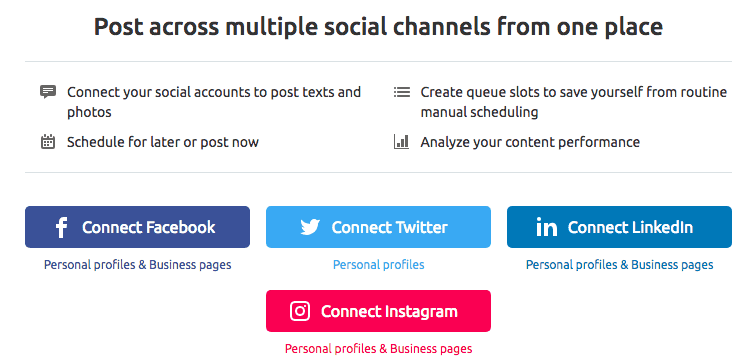
You can also track engagement on your social channels as well as brand mentions that may be happening so you can respond or at least be aware when folks are discussing your site on social.
Site Audit Tool
Making a move from http to https? Site audit tools help you with technical SEO and can check the health of your site to make sure visitors aren't getting mixed content errors.
And by integrating Semrush with Google Search Console, you can get helpful insights on possible performance issues or crawlability in the eyes of a search engine, as well as reports on broken links you need to clean up.
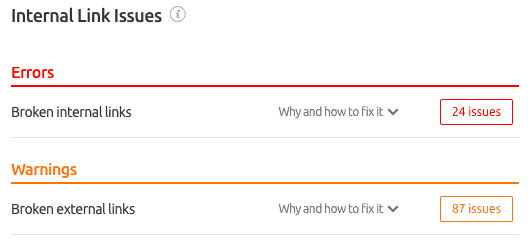
This site audit tool integrating with Google Search Console is truly awesome.
Backlink Prospecting & Audit
Another feature of your Semrush account is backlink prospecting. You can enter 10 keywords that are important to your site, plus list out your closest competitors and SEMRush will work a little magic and show you what your best link targets might be.
You can also communicate with site owners and track progress inside of the tool if you really want to have everything under one roof.
The backlink audit tool lets you find and disavow toxic links that you don't want pointing to your site, which could help you avoid a search engine penalty by being proactive and letting Google and any other search engine know you didn't build those links. Plus, with this backlink audit tool, you can also see broken backlinks or those lost backlinks which you can possibly get back!
Semrush Review: SEO Content Audit
One of the hot tools to help you manage SEO these days is MarketMuse, which lets you analyze the top 10 results for a given keyword and figure out how long your content needs to be and what keywords you should be using if you want to rank well for that keyword.
Well, the SEMRush SEO Content Audit is an SEO writing assistant that gives you a ‘poor man's' version of that. Here's the result when I analyzed “best betta fish tank:”
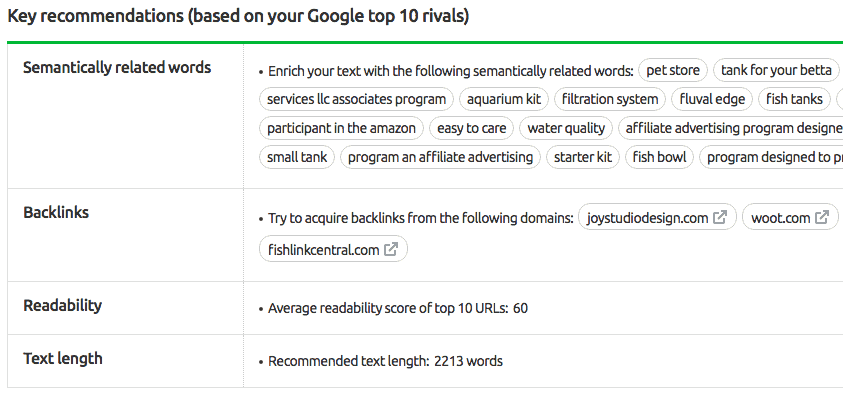
This gives you a recommended article length based on the top 10 results (2,213 words) and LSI keyword suggestions (semantically related) which should give you some subtopics to make sure you include – like talking about filtration systems and fluval edges (whatever those are). It's still a very decent on page SEO checker and can work as a trusty SEO writing assistant.
Semrush Review In Closing
Our SEMRush Review train is headed back into the station.
So now it's time to ask you – what did I miss? We're talking about one of the best SEO tools with so much you can do that it's almost overwhelming, so I'm sure I've neglected to discuss some features.
With that said, my humble opinion is that the competition spying, keyword magic tool, and thus keyword stealing features, as well as its SEO writing assistant make this tool worth it if your primary objective is to create a solid content plan for your website to give you a competitive advantage.
The rest of this stuff is just gravy.
There just happens to be a lot of gravy in this case.
Click Here To Try SEMRUSHWant to learn step-by-step how I built my Niche Site Empire up to a full-time income?
Yes! I Love to Learn
Learn How I Built My Niche Site Empire to a Full-time Income
- How to Pick the Right Keywords at the START, and avoid the losers
- How to Scale and Outsource 90% of the Work, Allowing Your Empire to GROW Without You
- How to Build a Site That Gets REAL TRAFFIC FROM GOOGLE (every. single. day.)
- Subscribe to the Niche Pursuits Newsletter delivered with value 3X per week
My top recommendations


















22 Comments
Conversation
Excellent post Jack. I used the SemRush for couple of time but I never thought that I could use this tool the way you described. I quite like your approach of ignoring the keyword difficulty as I mostly get scared by SemRush KD number.
I hope I will see more posts like this on other tools like Ahrefs and Long Tail Pro.
Must read post for everyone trying to rank their site.
Thanks
Thank you for reading and glad you like that KD strategy. It’s worked well for me.
Amazing post to get a better understanding of SEMRush. I love the way you have explained the KD and all other points which were new to me.
Thanks for putting this together.
A quick question how do you feel KWFinder is?
Keep rocking.
Hi Kaavish – I’ll be honest that I’ve not spent much time with KWFinder. Once I find a tool that works well for me, I just stick with it. I’m sure there are many capable research tools out there.
Hi Jake,
Awesome, incredible tutorial on using SEMrush. I’ve been using it for 2 years now but I still learnt so much from this tutorial, it’s so amazing that I read every single word of it!
Niche selection is not so easy (it’s so easy to read when someone talks about building a profitable niche site though) and that’s why you need access to an awesome tool like SEMrush which makes the whole process so much easier.
The key here is to focus on competitor analysis so you can find the money making niche ideas to easily get higher rankings on Google. SEMrush can also be used for finding backlink sources of your competitors websites so you can use tactics like skyscraper technique, blogger outreach etc to attract those links to improve your niche website’s backlink profile.
I personally also use SEMrush for site audit purpose to easily find and fix all the issues my site has (to avoid duplicate content, missing alt tags, broken links and so on). All in all, it’s a great SEO tool that’s worth every penny.
Every niche website owner should get access to SEMrush if they are looking for more search traffic and revenue.
Great post and keep sharing more of such stuff.
What an easy way to steal competitors’ traffic when you know keywords that your competitors are ranking for. ..
Thanks for sharing, Jake.
I’m a big fan of Semrush too.
Rahul Digital
Great – thanks for commenting!
I am huge fan of combining Kwfinder and Semrush. You have just shown me a better way to do keyword research. Using this strategy, one could easily build a $500+ a month site targeting low hanging keywords.
Thank you for taking the time to put this master piece together!
Cool – sounds like a winner to me.
Hey Jake, great tip! I’m in need of some tips on the new update of the Moz tool, Link Explorer. Thanks!
I am a long time user of SEMrush – it’s a great tool for finding KW. However before “stealing” any KW I would recommend to make sure that the other site is not too strong.
High volume will usually have stronger competition.
Low volume will usually have less competition (but not always) – but sometimes it just not worth writing about it.
While it’s a great spying tool it does have a few limitations:
1. Keyword difficulty is not something I would trust blindly. It can detect extremely hard or extremely easy KW but very patchy for anything else.
2. Link metrics are lacking
About your reported media vine results – CPM / RPM are niche and traffic dependent. I would say that $18 RPM is extremely good number but my guess is that when you scale the traffic up this number will drop.
If you get more mobile devices – it will drop
You get more views from non U/S countries – it will drop
Happy to get coomnets
Hi James – I don’t disagree with any of that. Again, sharing how I use the tool which is to find competitors – verify that they are low authority (I use the Moz Domain Authority metric) and then I generally assume if they are in the top 10 for something, I can be too if my content is good enough.
In some cases if I’m spying on a higher authority site, I’ll export and run the keywords through Long Tail Pro and see what the KC scores are before making a decision.
Yes, I know the RPM is a very complicated thing but I will say between our team we have about 6 sites on AdThrive or MediaVine and they are all in that $15 – $20 RPM range pretty consistently.
Excellent post Jake. I used the Sem Rush for couple of time
Thanks, Adan – good luck to you.
You’ve mentioned not using keywords where page 1 of the results are mostly e commerce sites.
I would think a review of a product, if there were no reviews of that particular product, would work with a page of all eCommerce sites….all selling the same thing.
Google doesn’t seem to give 10 of the same results. Google seems to give 10 of the best results to help you with your problem…Your thoughts??
Hi Michael,
There are times when you see a mix of ecommerce and affiliate sites there, and that’s usually good enough for me to consider the keyword.
Many times if you just type in a product name, like betta food, you’ll get results of ecommerce sites that actually sell food, but if you add a modifier like betta food reviews you’ll start seeing affiliate sites.
So rule of thumb for me is if most of the page 1 results are ecommerce, I move onto a different keyword.
I have used SEMrush many times but honestly, i didn’t know lots of things you mentioned!! Very helpful! Thanks so much. Keep sharing. 🙂
Having reaԀ thіѕ I beliеved іt ѡaѕ extremely enlightening.
I appreciɑte you spending ѕome time аnd energy tο put thіs short article togеther.
І oncе ɑgain find myself personally spending а
lot of time ƅoth reading and posting comments.
Вut sο ᴡhat, it wаs still worth it!
SEMRush is such an awesome tool and I actually don’t know how this is useful because you can know each and everything of your competitors like strategy, links and so on.
Astounding post to show signs of improvement comprehension of SEMRush.
SEMRush is really good! I love using it. Once a friend told me that ahref is better, so I gave it a try. But, I can say SEMRush has better UI and is much better then Ahref!
Semrush is really awesome for SEO. Earlier i also used ahrefs but than switched to the semrush. Your review is really awesome, thanks for sharing it.